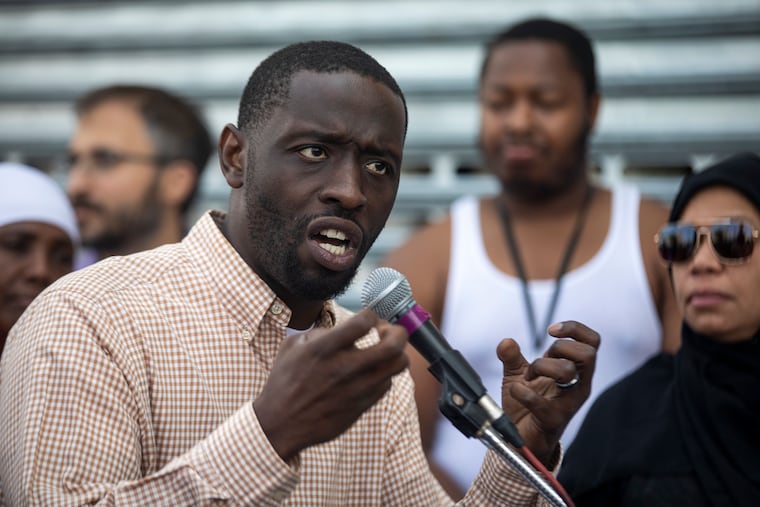With Driving Equality bill on the books, a pilot program takes aim at police stops of pedestrians | Opinion
For three months, officers refrained from making stops for low-level offenses. The results? Harmful interactions that resulted from forcible stops were avoided and racial disparities were reduced.

Each year, Philadelphia police engage in hundreds of thousands of stops of pedestrians and cars, some of which are without legal justification, and which have always been highly racially disparate. Moreover, a substantial number of these stops are for minor offenses that do not endanger the public and which almost never lead to recovery of a weapon or an arrest.
The issues regarding these stops have been at the forefront of public policy debates on policing and in judicial proceedings. Last year, a ballot measure in Philadelphia calling for the end of “unconstitutional” stop-and-frisks was approved, and in the wake of the death of George Floyd, there has been even more heightened national attention to these and related policing issues.
In a civil rights case (in which I am cocounsel), Bailey v. City of Philadelphia, there have been significant reductions in the number of pedestrian stops and improvements in the legality of the interventions. However, the Police Department has recently acknowledged that the long-standing racial disparities in stops reflect patterns of actual racial bias.
At the same time, data analysis by the Defender Association of Philadelphia revealed even higher levels of racial disparities for car stops. In response, City Council, the federal court, and the Police Department have initiated two significant reforms that provide less intrusive alternatives for addressing low-level offenses which can effectively resolve the offense, reduce the number of unnecessary stops, and thereby promote racial equity in policing.
» READ MORE: Philly has become the first big city to ban minor traffic stops said to criminalize ‘driving while Black’
First, Mayor Jim Kenney has signed legislation drafted by City Councilmember Isaiah Thomas, the Driving Equality bill, that provides new procedures designed to ensure the “just, equitable and fair enforcement” of traffic laws. This ordinance prohibits forcible stops of cars for several categories of minor traffic violations that do not endanger the public, such as a single broken light, improper placement of temporary registration permits or license plates, and malfunctioning exhaust and muffler systems. The Police Department remains free to notify the vehicle owner of the violation as a means of securing compliance.
Philadelphia is the first city in the country to embrace this reform, the wisdom of which is obvious: car stop encounters can lead to unnecessary friction between police and civilians, and even in some tragic cases, deaths of civilians or officers. The ordinance also provides for audits and oversight to measure the impact of the new policies. If this reform proves successful, other minor motor vehicle offenses could be addressed in a similar manner.
Second, in response to a federal court order for the development of remedial measures to reduce high racial disparities and bias in pedestrian stops, the Police Department has instituted a pilot project in the 14th Police District (which includes Germantown, Mount Airy, and Chestnut Hill) in which police officers refrain from making forcible stops for low-level “quality-of-life” offenses (e.g., an open liquor container, littering, minor disturbances), and instead instruct the person to stop the prohibited conduct and move on. If the person refuses, the police can engage in a forcible stop and write a summons or provide a further warning.
» READ MORE: Curtailing improper traffic stops is a path to more effective and equitable policing | Editorial
Remarkably, over the three-month pilot project, police engaged in over 300 of these non-forcible interventions, and in all cases reviewed to date, the person complied with the police directive. Under this program, quality-of-life violations are effectively resolved with no intrusive intervention. Harmful interactions that result from forcible stops are avoided and racial disparities are reduced. In this pilot, over one-half of what would have been forcible pedestrian stops were avoided, with no evidence of any causal effect of any increased crime or any showing of community displeasure with the project.
These initiatives, which are the result of collaborative efforts involving the Police Department, community groups, City Council, and civil rights and public defender agencies, provide a strong model for smarter and more effective policing, here and for other localities. And more can be done by expanding the pedestrian pilot to all police districts and adopting systems of alternative professional responders for issues that involve homeless persons and individuals with mental health conditions.
Reducing the police “footprint” is an important move toward building a meaningful policy of community policing that allows for effective but less invasive police interventions, avoids unnecessary conflicts with civilians, and helps to build trust between the police and the communities which they serve.
David Rudovsky is a senior fellow at University of Pennsylvania Carey Law School.